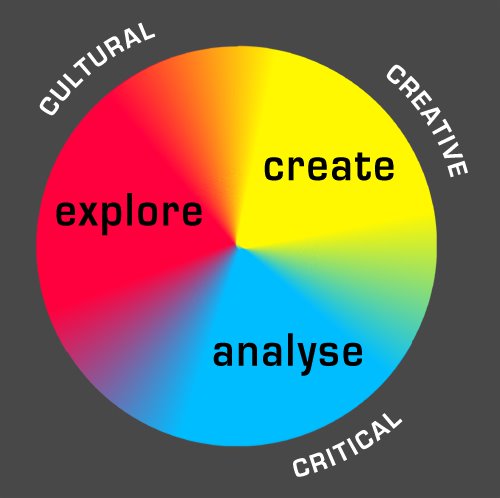Screen Literacy: Critical, Cultural and Creative Approaches
Screening Literacy (the 2011 European Commission on film education) defined screen literacy as: “The level of understanding of a film, the ability to be conscious and curious in the choice of films; the competence to critically watch a film and to analyse its content, cinematography and technical aspects; and the ability to manipulate its language and technical resources in creating moving image production”.
In other words, the development of critical, cultural and creative skills, taught interconnectedly. These '3Cs' are the backbone of all screen education work. Every film on Screening Shorts has three tabs containing critical, cultural and creative activities designed expressly for that specific film.
Critical Approach
Critical skills are not just about analytical knowledge of technique or even of literacy skills. Critical thinking skills include: developing, evaluating and responding to arguments; examining something from multiple perspectives; questioning evidence or assumptions; devising imaginative ways to solve problems; formulating and articulating thoughtful questions; identifying themes or patterns and making abstract connections.
Pupils who learn how to think critically are therefore better able to take responsibility for their thoughts and actions, have confidence in their present knowledge and position, possess a better sense of self, and demonstrate an understanding and compassionate heart toward those with different opinions.
Examining a film critically means analysing the film's language, characters, themes, etc. looking for as many different effects of these as possible; but it also means considering alternative interpretations of everything on screen. And critical thinking when filmmaking is a must.
Cultural Approach
Cultural skills focus on screen texts as the creator of social consciousness. They spread messages, expose the viewer to a variety of social and cultural representations, develop an understanding of the diverse wants, needs and expectations of different audiences, permit personalisation, choice, breadth and depth and allow an understanding of where someone's personal narrative sits.
All cultural activity has the capacity to inspire learning by its very nature. Artistic experiences can challenge and influence how we respond to the world in reflective and imaginative ways. Cultural learning has huge benefits for individuals and society in terms of wellbeing, employability and skills development.
A cultural approach to screen education means considering the different historical, political and social contexts of a film; but it also brings the existing knowledge of young people to the fore, allowing them to make connections between what they've just watched and what they have previously watched, read, experienced... This gives value to each individual pupil's contribution as it is all valid.
Essentially, this means, when we watch a film:
- What do we learn about the world?
- What do we learn about ourselves?
- What do we bring from ourselves?
Creative Approach
Creative skills are those developed from artistic and cultural activity. Within screen education, this may mean learning skills in the use of camera equipment or editing software, or how to design a set, costume, lighting or soundscape; but it also means learning how to be open minded, constructively inquisitive, able to harness our imagination, able to identify and solve problems and develop creative approaches to learning.
The only limit on a creative approach is your - and your pupils' - imaginations!
